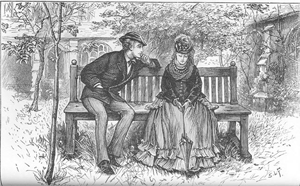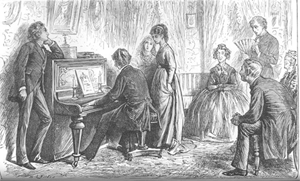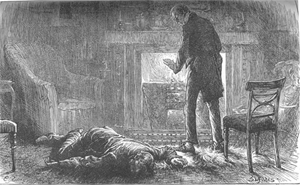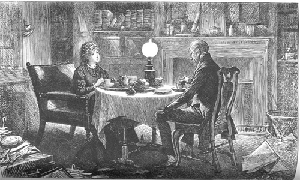Readers' Guide: The Mystery of Edwin Drood by Charles Dickens
The Mystery of Edwin Drood
Category: FICTION
Guide Created By: Marcie
Discussion Leader(s): Deems & Marcie
Read our archived discussion of this book
Guide Description
 Had Dickens lived to complete "The Mystery of Edwin Drood," his 15th novel would have been one of his major accomplishments, say many of his critics. The novel was scheduled to be published in twelve installments from April 1870 to March 1871. Only six of the installments were completed before Dickens's death in 1870, which left the mystery half finished.
Had Dickens lived to complete "The Mystery of Edwin Drood," his 15th novel would have been one of his major accomplishments, say many of his critics. The novel was scheduled to be published in twelve installments from April 1870 to March 1871. Only six of the installments were completed before Dickens's death in 1870, which left the mystery half finished. Relevant Links
Librivox text and audio versions of the bookVideo clips about Dickens life
Cover illustration for the whole series
Photocopy of the last page that Dickens wrote
The Mystery of Edwin Drood - the musical: video of two numbers performed by the original cast
The Mystery of Edwin Drood - the musical: music samples
The Mystery of Edwin Drood - the musical: the lyrics
"When the wicked man..." ends the first chapter.
The Order for Evening Prayer, Daily throughout the year
At the beginning of Evening Prayer the Minister shall read with a loud voice some one or more of these Sentences of the Scriptures that follow. And then he shall say that which is written after the said Sentences. When the wicked man turneth away from his wickedness that he hath committed, and doeth that which is lawful and right, he shall save his soul alive. Ezek. 18.27
Article on Lascars working from the London docks
Article on Turkish Delight
Article about quicklime
Article about rooks
Article on how often to wind mechanical watches
Related Photos
Photos related to Dickens and Drood taken in LondonPicture of a weir and Painting of a weir
Photos of Rochester Cathedral
Related Books and Articles
THE D CASE OR THE TRUTH ABOUT THE MYSTERY OF EDWIN DROOD by Charles Dickens, Carlo Fruttero and Franco LucentineDrood by Dan Simmons
The Last Dickens by Matthew Pearl
The Puzzle of Dickens' Last Plot by Andrew Lang
Unravelling The Collins-Fildes Monthly Wrapper for The Mystery of Edwin Drood: The Solution to Dickens's Conundrum?
Questions for Consideration
Chapters 1-6
1. Chapter 1 is very strange. It's a good idea to reread it to pick up the oddness. What elements do you find confusing? Do you know anything about where you are and who the unnamed people in the bedroom are? What's going on?
2. What do you make of the end of Chapter 1? Who is the "jaded traveller"? What tone does the opening of the cathedral service, WHEN THE WICKED MAN. . ., establish?
3. The narration is in the present tense, unusual in Dickens' time and even today. Does it have any effect on you? Why do you suppose Dickens' chose to use the present tense?
4. Who, among the characters we meet in Chapter 2, is the man from the opium den in Chapter 1?
5. What is the arrangement between Edwin Drood and "Pussy" (Rosa Bud)? Do you detect interest in Rosa on John Jasper's part? Why does he have a sketch of Rosa on his wall?
6. Chapter 3 introduces more new characters. What's your response to Miss Twinkleton and Rosa Bud? Can you imagine yourself a student in Miss Twinkleton's Seminary for Young Ladies? Why is Miss Twinkleton's life described as double?
7. What difficulties do Edwin and Rosa seem to be having as they walk out together from the Nun's House? Are they the typical engaged couple?
8. Chapter 4 opens "Accepting the jackass as the type of self-sufficient stupidity and conceit--a custom, perhaps, like some few other customs, more conventional than fair--then the purest Jackass in Cloisterham is Mr Thomas Sapsea, Auctioneer." What is your impression of Sapsea? Of his inscription for his deceased Ethelinda's monument? Could you have stood being married to Mr. Sapsea?
9. Durdles, the stonemason, is another of Dickens' comic characters. What is memorable about him?
10. In Chapter 5, we accompany Mr. Durdles as he encounters "Deputy," the boy he pays for throwing stones at him if he is out too late. What questions do you ask yourself as you read this chapter?
11. Chapter 6--What is your first impression of Luke Honeythunder? Of his wards, Neville and Helena Landless? Do you find them exotic?
12. What do you make of the scene with Septimus Crisparkle and his mother? Do you find the scene warm? Is Dickens having some fun with Luke Honeythunder, who, in addition to being a Philanthropist, has no sense of humor? What causes all the guests to leave the Crisparkle dinner party early?
Chapters 7-12

1. Why is Neville Landless so short-tempered?
2. How does Neville explain his knowledge of his sister, Helena's, feelings?
3. Why does Rosa burst into tears while crying at the piano? Were there earlier signs of her apprehension?
4. Chapter 8: Daggers Drawn. Have you been paying attention to chapter titles? This one seems ominous. Are these real or metaphorical daggers--like the one Macbeth sees just before he murders Duncan (Is this a dagger I see before me/ The handle toward my hand)? Why are Edwin and Neville so much at odds?
5. Do you agree with Neville's assessment of Edwin Drood? Notice that both young men have "thick and indistinct" speech while having drinks with Jasper. Has Jasper doctored the mulled wine? What is mulled wine?
6. Why does Jasper appear at Crisparkle's door?
7. How did Rosa lose her parents? Do you understand how Rosa came to be so childish?
8. How does Dickens describe the way rumors move in a small city?
9. What important information about the betrothal does Rose receive from her guardian, Mr. Grewgious?
10. What does Grewgious mean be describing himself as a "dry chip"? As "angular"?
11. When Crisparkle goes to Jasper to report on his peace-making efforts, Jasper "sprange from the couch in a delirious state between sleeping and waking." In this state, he cries out "What's the matter? Who did it?" Is Jasper's "nap" the result of opium?
12. Why is Jasper keeping a diary of Edwin's life, and why does he share several entries with Crisparkle?
13. In Chapter 11, set at Grewgious' London office, how does Dickens mix the comic and serious?
14. How many instances of foreshadowing can you find in Chapter 12: A Night with Durdles?
15. What do you make of Durdles' dream? Does the bottle contain something more than wine?
Chapters 13-18

1. Chapter 13--"Both at Their Best": What has caused Edwin's new seriousness in his approach to Rosa? Is it significant that he no longer addresses her as "Pussy"?
2. Edwin admits to Rosa that he sometimes fears Jack Jasper. Why?
3. Do we see Rosa and Edwin at their best in this chapter?
4. Chapter 14--"When Shall These Three Meet Again?": Notice the chapter title is from Macbeth. Have you noticed any other references to Macbeth? Why that play?
5. What are Neville Landless's plans for the two weeks after Christmas?
6. What strange woman does Edwin encounter on his walk? What does she tell him about "Ned"? Can you figure out who she is?
7. What are Jasper's plans for his diary?
8. Chapter 14 ends with a violent gale that topples chimneys and tears off the hand of the Cathedral clock. Does the violent storm foreshadow more damage?
9. Chapter 15--"Impeached." What definition of "impeach" seems applicable here? What is Jasper's reaction when Grewgious tells him that Edwin and Rosa have broken their engagement?
10. Chapter 16--"Devoted." Were you surprised that Crisparkle swam in the weir in December? What is a weir?
11. Does Sapsea's quoting of Bentham make sense? Who was Bentham and what were his words?
12. What clue do you find in the watch that has run down? Now that most of our watches run on batteries, do you remember how often a watch needs to be wound?
13. Chapter 17--"Philanthropy, Professional and Unprofessional". What is Dickens' view of Philanthropists, put in the thoughts of Crisparkle?
14. Why does the narrator proclaim that Crisparkle is a "good fellow," a "true soul"?
15. Chapter 18--"A Settler in Cloisterham". How does Mayor Sapsea respond to Datchery"s addressing him in the third person: Were you surprised to see another character introduced? What could Datchery be up to?
Chapters 19-23

1. Chapter 19--Shadow on the Sun-Dial--what is the significance of the title?
2. What is Jasper willing to sacrifice for Rosa? Were you surprised by his declaration of love? Was Rosa?
3. Chapter 20--A Flight. Is it a good idea for Rosa to go to Mr. Grewgious? Does he seem less "angular" and "dry" now that we've seen more of him?
4. Chapter 21--A Recognition. Mr Tartar has a history, it seems. What do you think Dickens might have planned for him? How old is he?
5. Chapter 22--A Gritty State of Things Comes on. Can you picture Tartar's home and the conversation between Rosa and Helena Landless? Which parts of the description stand out?
6. Why does Billickin object to signing the lease with her Christian name?
7. Are the Billickin and Miss Twinkleton worthy opponents?
8. Why does Miss Twinkleton expurgate all the love scenes when reading to Rosa?
9. Chapter 23--The Dawn Again. Did you notice the shift back to present tense early in the chapter?
10. Why does the Princess Puffer follow Jasper from London to Cloisterham? 11.